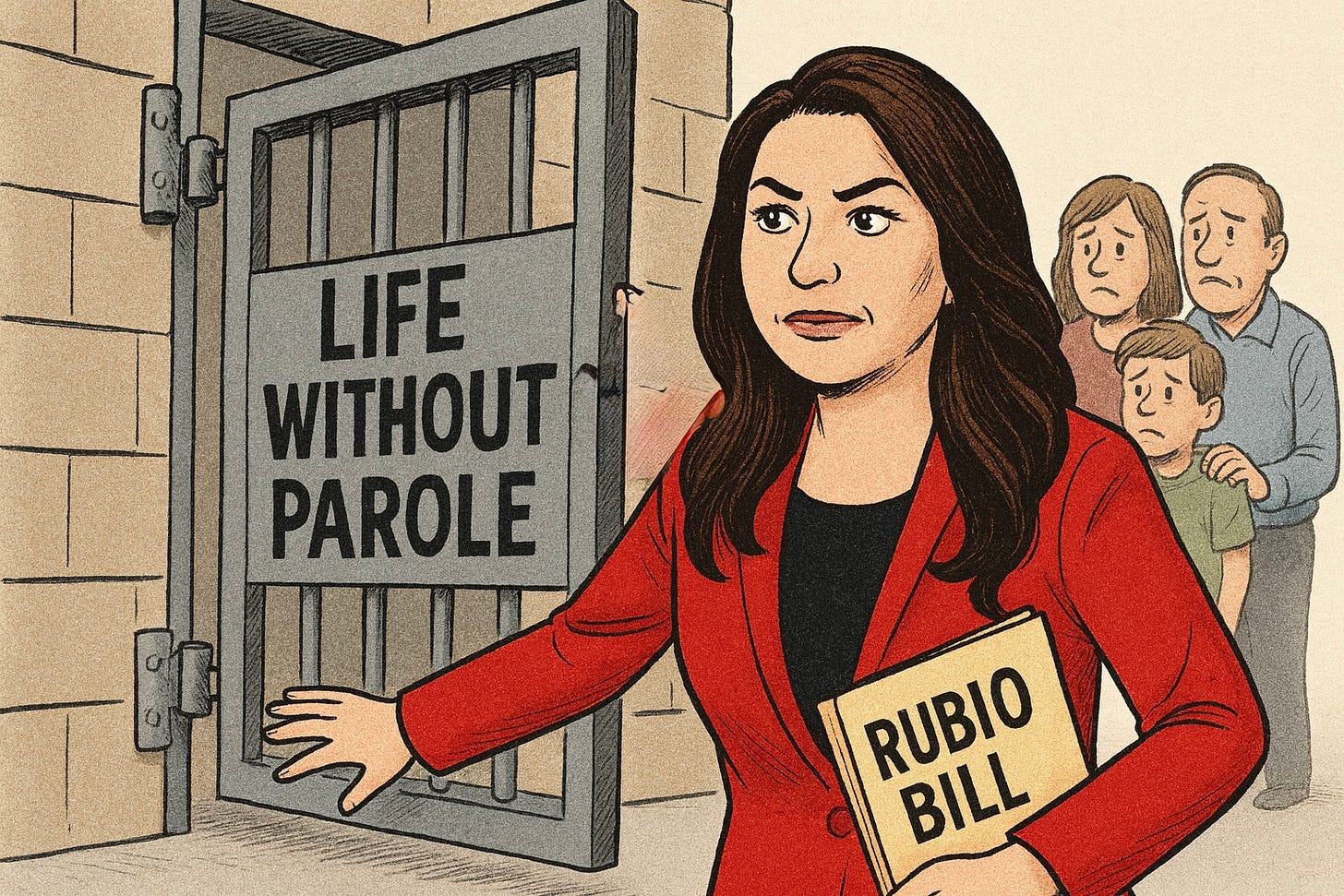Justice Betrayed? California’s Soft-on-Crime Agenda Rolls On
New legislation could free violent offenders, ignoring victims and the principles of accountability that define a free society.
🕒 4-minute read
Another Bill To Allow Murderers Out Of Their Life Sentences
This morning, I read a CalMatters article detailing a proposed bill by state Sen. Susan Rubio that would grant parole hearings to youth offenders serving life without parole sentences, including those who committed heinous crimes before age 25. The piece profiles Nathan Gould, who at 21 killed a man in Bakersfield, suffocating him for $68. Now, decades later, Gould seeks a second chance, and Rubio’s bill could make it possible. While the legislation is stalled until next year, its implications deserve our attention. This proposal reflects a troubling pattern I have witnessed in California—a soft-on-crime approach that undermines the primary purpose of the criminal justice system is supposed to do: punish wrongdoing and deter future crimes. Progressives seek to elevate the laudable secondary goal of rehabilitation, posing a threat to the core mission of government - keeping people safe.
Punishment and Deterrence: The Bedrock of Justice
“You do the crime, you do the time” may sound like a simple phrase, but it represents something fundamental to our society's work. Justice requires that actions have real consequences. When someone commits a violent crime—murder, in Gould’s case—the penalty must match the severity of what they did. Life without parole for such acts sends an unmistakable message: take a life, and you give up your freedom permanently.
What matters just as much is deterrence. Harsh penalties keep others from making the same terrible choices. Rubio’s bill threatens to weaken punishment and deterrence, suggesting that even the most serious crimes might not have permanent consequences. This damages our fundamental understanding of living in society together—that individual freedom depends on taking personal responsibility for our actions.
As philosopher John Locke wrote, “The end of law is not to abolish or restrain, but to preserve and enlarge freedom.” Freedom works best when people control their behavior and respect the rights of others. Making excuses for terrible crimes by pointing to youth or difficult circumstances removes the personal agency that makes us human. When we call offenders “victims of society,” we ignore the fact that they made choices, embracing a way of thinking that blames outside forces—poverty, bad upbringing—instead of recognizing free will. This approach does more than weaken accountability; it attacks the very concept of liberty.
Victims Pay the Price for Leniency
The true tragedy of this soft-on-crime movement is how it affects victims. Marc Klaas, whose 12-year-old daughter Polly was kidnapped and murdered in 1993, captures the pain perfectly in a quote he gave to the San Jose Mercury News: “It takes decades-old cases of extreme pain and throws it back into everybody’s faces so we can give the criminal yet another chance. Where’s my consideration?”
Victims of the worst crimes work to rebuild their lives knowing that the people who hurt them are locked away forever. Forcing them to attend parole hearings, write letters, or relive their trauma amounts to cruelty. It victimizes them all over again, putting the offender’s chance at redemption above the survivor’s need to heal. California’s justice system should protect victims, not reopen their wounds in the name of misplaced compassion.
Sacramento’s Decades of Erosion
Sacramento’s progressive leadership has steadily weakened accountability in our criminal justice system for decades. From reducing penalties for theft to loosening sentencing enhancements, lawmakers have consistently moved toward being softer on crime. The Three Strikes Law, which came about because of public outrage over cases like Polly Klaas’s murder, once made sure that repeat offenders faced serious consequences. Yet reforms have diluted its impact, showing a broader shift toward leniency that I find deeply troubling.
Rubio’s bill represents another step down this path, offering parole to people who committed the worst crimes our society knows. This has nothing to do with fairness; it represents a systematic dismantling of the protections that keep law-abiding citizens safe. Each time we roll back these protections, we encourage criminals, weaken deterrence, and break faith with the public.
So, Does It Matter?
Rubio’s bill may offer a chance for redemption, but it will send a message that even grave crimes can be forgotten, forgiven. Though the legislation includes some narrowly defined exclusions, it still opens the door for many violent offenders to seek parole. The parole process, while thorough, can make mistakes—recidivism, though uncommon, still occurs. More importantly, it shifts our focus from justice to rehabilitation at the expense of victims and society.
California must stand firm on the principles of punishment and deterrence, ensuring that those violating others’ rights face inevitable, lasting consequences. Anything less undermines the freedom and responsibility that define what America stands for.




Deterrence is not the purpose of the CJ system. It's a by-product that cannot be measured or evaluated. We can hope for deterrence, but we will never know what crime wasn't committed.
I have very little faith in the criminal justice system in California and the rest of the country.